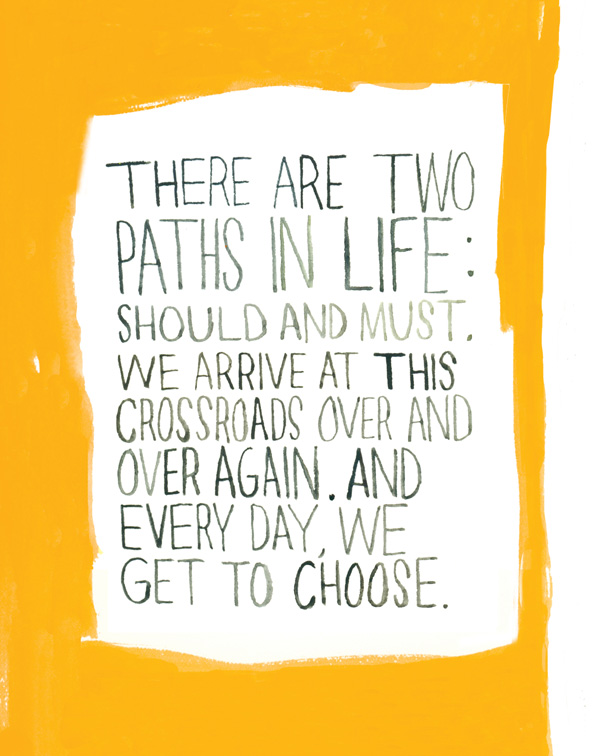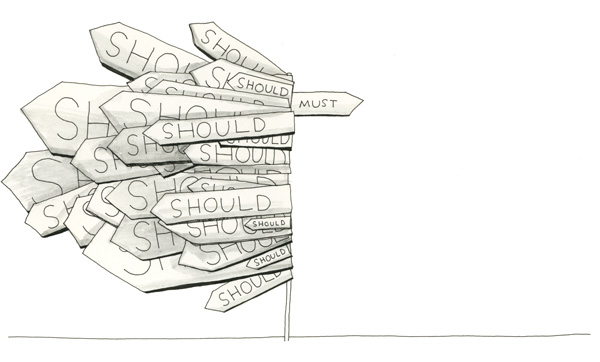The Crossroads of Should and Must: An Intelligent Illustrated Field Guide to Finding Your Bliss
“Should is how other people want us to live our lives… Choosing Must is the greatest thing we can do with our lives.”
“Does what goes on inside show on the outside?,” young Vincent van Gogh despaired in a moving letter to his brother while floundering to find his purpose. “Someone has a great fire in his soul and nobody ever comes to warm themselves at it, and passers-by see nothing but a little smoke at the top of the chimney.” A century later, Joseph Campbell stoked that hearth of the soul with his foundational treatise on finding your bliss. And yet every day, countless hearths and hearts grow ashen in cubicles around the world as we succumb to the all too human tendency toward choosing what we should be doing in order to make a living over what we must do in order to feel alive.
How to turn that invisible inner fire into fuel for soul-warming bliss is what artist and designer Elle Luna explores in her essay-turned-book The Crossroads of Should and Must: Find and Follow Your Passion (public library) — an intelligent and rousing illustrated manifesto that picks up where Campbell left off, in the spirit of Parker Palmer’s emboldening guide to letting your life speakand Debbie Millman’s visual-essay-turned-commencement-address on courage and the creative life.
Distinguishing between a job (“something typically done from 9 to 5 for pay”), a career (“a system of advancements and promotions over time where rewards are used to optimize behavior”), and a calling (“something that we feel compelled to do regardless of fame or fortune”), Luna recounts the pivotal moment in her own life when she was suddenly unable to discern which of these she had. As an early employee at a promising startup, she was working tirelessly on a product she deeply believed in, and yet felt disorientingly unfulfilled. She found herself before a revelatory crossroads: the crossroads between Should and Must.
Luna writes:
Should is how other people want us to live our lives. It’s all of the expectations that others layer upon us.
Sometimes, Shoulds are small, seemingly innocuous, and easily accommodated. “You should listen to that song,” for example. At other times, Shoulds are highly influential systems of thought that pressure and, at their most destructive, coerce us to live our lives differently.
Echoing Eleanor Roosevelt’s famous admonition — “When you adopt the standards and the values of someone else … you surrender your own integrity,” the longest-serving First Lady wrote in contemplating conformity and the secret of happiness, “[and] become, to the extent of your surrender, less of a human being.” — Luna adds:
When we choose Should, we’re choosing to live our life for someone or something other than ourselves. The journey to Should can be smooth, the rewards can seem clear, and the options are often plentiful.
She offers a counterpoint:
Must is different. Must is who we are, what we believe, and what we do when we are alone with our truest, most authentic self. It’s that which calls to us most deeply. It’s our convictions, our passions, our deepest held urges and desires — unavoidable, undeniable, and inexplicable. Unlike Should, Must doesn’t accept compromises.
Must is when we stop conforming to other people’s ideals and start connecting to our own — and this allows us to cultivate our full potential as individuals. To choose Must is to say yes to hard work and constant effort, to say yes to a journey without a road map or guarantees, and in so doing, to say yes to what Joseph Campbell called “the experience of being alive, so that our life experiences on the purely physical plane will have resonance within our innermost being and reality, so that we actually feel the rapture of being alive.”
Choosing Must is the greatest thing we can do with our lives.
And yet as simple as Luna’s elegant prose makes it sound, anyone who has lived through this crossroads — she has; I have — will attest that it is anything but easy; the road is strewn with difficult choices. Luna considers the osmotic relationship between Should and Must, even as we turn away from one and toward the other:
If you want to know Must, get to know Should. This is hard work. Really hard work. We unconsciously imprison ourselves to avoid our most primal fears. We choose Should because choosing Must is terrifying, incomprehensible. Our prison is constructed from a lifetime of Shoulds, the world of choices we’ve unwittingly agreed to, the walls that alienate us from our truest, most authentic selves. Should is the doorkeeper to Must. And just as you create your prison, you can set yourself free.
One of the most common ways in which we imprison ourselves is by comparing ourselves to others and, upon finding our situation inferior, placing blame — on circumstances that we feel are unfair, on the people we believe are responsible for those circumstances, or on some abstract element of fate we think is at play. The self-defeating catch is that we often end up judging our circumstancesagainst others’ outcomes, forgetting that hard work and hard choices are the transmuting agent between circumstance and outcome.
Joseph Brodsky captured this with piercing precision in the greatest commencement address of all time, cautioning: “A pointed finger is a victim’s logo… No matter how abominable your condition may be, try not to blame anything or anybody: history, the state, superiors, race, parents, the phase of the moon, childhood, toilet training, etc. The menu is vast and tedious, and this vastness and tedium alone should be offensive enough to set one’s intelligence against choosing from it. The moment that you place blame somewhere, you undermine your resolve to change anything.”
Luna touches on this perilous tendency as she considers the origin of Should:
How often do we place blame on the person, job, or situation when the real problem, the real pain, is within us? And we leave and walk away, angry, frustrated, and sad, unconsciously carrying the same Shoulds into a new context — the next relationship, the next job, the next friendship — hoping for different results.
How to get to know Should in the most intimate way possible, so that we can begin to swivel toward different results by moving toward Must, is what Luna examines in the remainder of The Crossroads of Should and Must. In this wonderful Design Matters conversation with one of her creative heroes and influences, Debbie Millman, Luna discusses how the book came to be, the unusual journey that precipitated it, and why her original essay resonated — beyond her wildest expectations — with so many people across so many walks of life:
Must is fantastic, and Must is just on the other side of Should. Should is this world of expectations — it’s like a camouflaged force. That’s one of the tricky things about Should — it can kind of creep in there when you’re not looking. It’s easier — it’s this invisible force moving against us [and] it often comes very early on in life. It can come from the time into which we’re born, the society or the community into which we’re born, the body into which we’re born… It can be a lot of different things that happen early in life [which] really take on that trajectory … and have us often running a different race than the one we were intended to run.
This article originally appeared in Brain Pickings and is republished with permission. The author, Maria Popova, is a cultural curator and curious mind at large, who also writes for Wired UK, The Atlantic and Design Observer, and is the founder and editor in chief of Brain Pickings.
SHARE YOUR REFLECTION
3 Past Reflections


On Jul 2, 2015 Kristin Pedemonti wrote:
here's to doing what we Must do, not necessarily what we "should" do. thanks for clarification and encouragement!
2 replies: Lo, Julie | Post Your Reply

On Jul 1, 2015 Virginia Reeves wrote:
Thanks for this good differentiation between should and must. Must is far more personal for me versus the 'should do' parameters that rule if not checked.





On Jul 7, 2015 TRYBYK wrote:
Never thought of it that way. Interesting. I will use it.
Post Your Reply